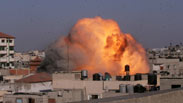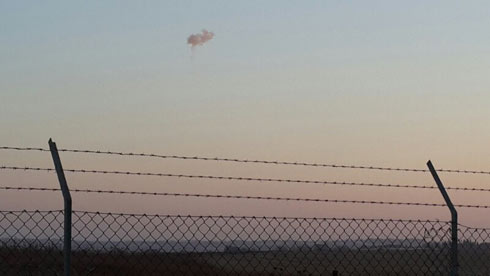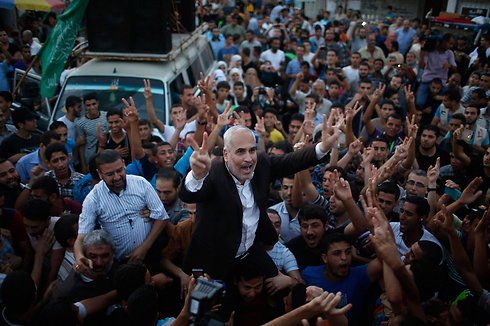
A ceasefire agreement between Israel and Hamas took hold at 7pm Tuesday evening, as both sides sought to end almost two months of fighting, Hamas meanwhile, kept up its attacks on Israel until the very last moment, and the rocket alerts in the south continued for at least 15 minutes after the truce came into effect.
An Israeli official said that Jerusalem had informed Egypt that it accepted its offer of an "open-ended" ceasefire after its cabinet ministers had been informed of the development.
The Egyptian Foreign Ministry said that talks between Israel and the Palestinians were to resume within one month from the start of the ceasefire, and that Israel would open its borders with Gaza to allow entry of reconstruction material and humanitarian aid.
An Israeli was killed and two others were wounded by mortar fire in the southern region of Eshkol shortly before the truce went into effect. In Gaza, police said an IAF strike had toppled a seven-story building in the town of Beit Lahiya, the sixth high-rise to be brought down in air strikes since the weekend.
Palestinian President Mahmoud Abbas' office confirmed shortly before 7 that a long-term ceasefire agreement had been reached; Hamas and state-run Egyptian television also reported prior to the Tuesday evening deadline that the two sides had agreed to end the fighting.
According to a senior source in Hamas, the agreement includes the opening of the Rafah crossing under the supervision of Abbas' security forces. An Israeli source said that the Egyptian offer did not include the majority of Hamas' demands.
Even though it apparently had little to show for, Hamas declared victory. In Gaza, massive gunfire erupted as 7 o'clock came. Chants normally reserved for Muslim holidays could be heard from mosque loudspeakers.
"We are here today to declare the victory of the resistance, the victory of Gaza, with the help of God, and the steadfastness of our people and the noble resistance," Hamas spokesman Sami Abu Zuhri said in a news conference at Gaza's Shifa Hospital.
He warned that this was only an interlude in Hamas' fight against Israel.
"The value of this campaign is not in the opening of this crossing or that crossing, but in paving the way for the next stage - liberating Jerusalem," Zuhri said.
Hamas and Islamic Jihad said earlier Tuesday that the ceasefire included an Israeli agreement to ease its blockade of Gaza, to allow relief supplies and construction materials into the battered territory.
Talks on more complex issues, such as Hamas' demand to build an airport and a seaport for Gaza, would begin in a month, said Ziad Nakhala, a senior Islamic Jihad official.
Talks on deeper issues, such as Hamas' demand to reopen Gaza's airport and seaport, would begin in a month.
The official spoke on condition of anonymity pending the announcement.
Attila Somfalvi, the Associated Press, and Reuters contributed to this report.

















